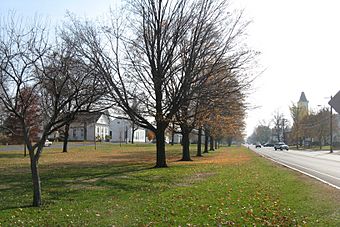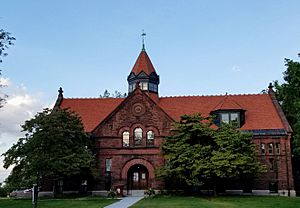Belchertown Center Historic District facts for kids
Quick facts for kids |
|
|
Belchertown Center Historic District
|
|

Belchertown Common
|
|
| Location | Belchertown, Massachusetts |
|---|---|
| Architectural style | Greek Revival, Late Victorian, Federal |
| NRHP reference No. | 82001913 |
| Added to NRHP | June 2, 1982 |
The Belchertown Center Historic District is a special area in Belchertown, Massachusetts. It's like a time capsule, showing what the town center looked like long ago. This historic district is built around Belchertown's large town common, which is about 1,200 feet (366 meters) long. The district includes 55 important buildings along South Main Street, Maple Street, and other nearby roads. This historic area was added to the National Register of Historic Places in 1982. This means it's officially recognized as an important part of American history.
Exploring the Belchertown Common
The heart of the Belchertown Center Historic District is its beautiful town common. This open space has been a central gathering spot for centuries. You can find several interesting things here. There's a bandstand, which is a small stage where musicians might have played in the 1800s. There's also a special memorial dedicated to the town's soldiers who fought in the American Civil War. A cannon and a flagpole also stand on the common.
The common is surrounded by many old buildings. Most of these are made of wood, but three are made of brick. These buildings are very old, dating back to the 1700s and early 1800s. They show off architectural styles like Georgian and Federal. These styles were popular when America was a new country.
Historic Buildings on Main and Maple Streets
Many buildings in the district are found along South Main Street. Most of these were built in the mid-to-late 1800s. They often feature the Greek Revival style, which looks like ancient Greek temples. This part of the district also has the only examples of Queen Anne architecture. This style is known for its towers, turrets, and decorative details.
One important building here is the Clapp Memorial Library. A famous architect named H.F. Kilburn designed it.
Along Maple Street, you'll find more historic houses from the same time period. Some houses here were built even later, in the early 1900s. Maple Street is also home to Belchertown's only stone house. This building now houses the Belchertown Historical Association. It's a great place to learn more about the town's past. You can also see the only Carpenter Gothic building in Belchertown on Maple Street. It's called the Towne House and was built in 1886.
Important Public Buildings and Churches
The district includes two town halls. The Old Town Hall was built around 1865 and is in the Greek Revival style. The "new" town hall is called Lawrence Memorial Hall. It was built in 1923 and shows the Gothic Revival style. This style often has pointed arches and tall windows, like old cathedrals.
There are also three churches in the historic district. The Congregational Church is the oldest church in town, built between 1789 and 1792. There's also a Methodist church building. It was actually moved here from Springfield in 1872! Finally, a Roman Catholic church is also part of the district. It was originally built in 1836 as a second Congregational meeting house.




